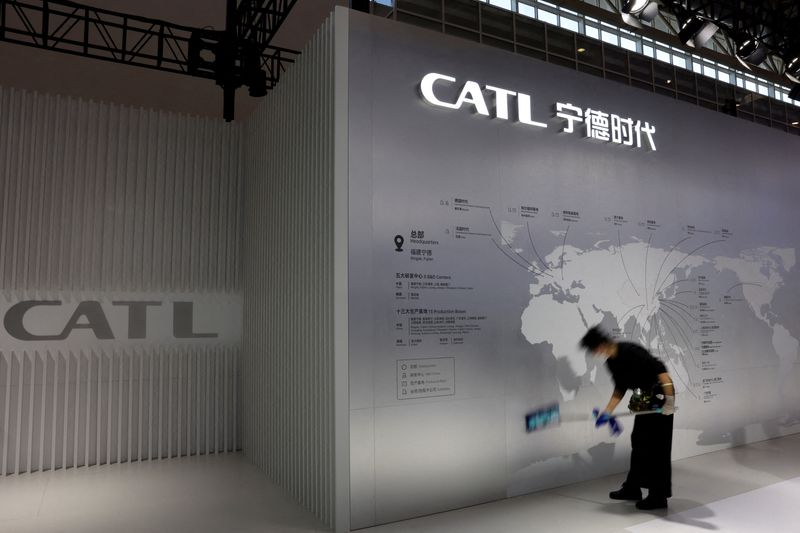Written by Michael Martina, David Shepardson, and Karen Freefield
WASHINGTON/NEW YORK (Reuters) – The U.S. Defense Department said on Monday it has added Chinese tech giant Tencent Holdings (OTC:) and battery maker CATL to a list of companies it says are working with the Chinese military, in a move that could escalate U.S.-China tensions. .
Hong Kong-listed shares of Tencent, the parent company of Chinese instant messaging app WeChat, fell 7.3% on Tuesday, losing about HK$275 billion ($35.4 billion) in market value. Shenzhen-listed CATL shares closed 2.8% lower. Decreased 32.2 billion yuan ($4.4 billion) in market value.
The two companies described this move, which comes two weeks before US President-elect Donald Trump takes office, as a “mistake.” Tencent said on Tuesday that its business would not be affected, and that it would begin a reconsideration process to correct its listing and, if necessary, take legal action.
CATL, the world’s largest electric vehicle battery maker, said it “does not engage in any military-related activities.”
Although the designation does not include an immediate ban, it could be a blow to the reputation of affected companies and represents a stark warning to US entities and companies about the risks of doing business with them. It could also increase pressure on the US Treasury to impose sanctions on companies.
The annually updated list of Chinese military companies, formally mandated under U.S. law as the “Section 1260H List,” identified 134 companies, according to a notice published in the Federal Register.
It also included chip maker Changxin Memory Technologies, Quectel Wireless, drone maker Autel Robotics, and China’s largest shipping company COSCO Shipping Holdings, according to a document published Monday.
Two entities owned by state-owned offshore oil giant China National Oil Corporation, CNOOC (NYSE:) China Ltd and CNOOC International Trading, were also listed.
A Quectel spokesperson said the company “does not work with the military of any country and will ask the Pentagon to reconsider its designation, which was clearly done in error.” Quectel shares fell nearly 7%.
Cosco’s Hong Kong-listed shares fell more than 4%. It and the other companies did not immediately respond to requests for comment.
The Chinese Foreign Ministry said in a daily press conference on Tuesday that it urged the United States to immediately lift the “unlawful unilateral sanctions” imposed on Chinese companies, adding that China will protect the legitimate rights and interests of its companies.
Impact on companies
The updated list is one of several measures Washington has taken in recent years to highlight and restrict Chinese companies, which it says pose security risks, affecting tense relations between the world’s two largest economies.
The purpose of the list of Chinese military companies (CMC) is to express the opinion of the Department of Defense that can serve as a reference for other government departments, Jefferies said in a research note.
“The most dangerous outcome for CMCs is a ban on US investment, but that is all up to Trump and his team.”
In 2021, the US Department of Defense removed Xiaomi (OTC:) after the Chinese tech company sued the US government for inclusion on the list. A federal judge called the US government’s process of annexing Xiaomi “deeply flawed.”
Evan Su, senior equity analyst at Morningstar, said he believes Tencent has a good chance of securing a disqualification through US courts, like Xiaomi, but its listing could result in reputational damage.
He added that Tencent’s earnings exposure in the US was in the high single-digit percentage range, consisting mostly of gaming revenue. “While this represents the maximum potential downside, we view Tencent’s US gaming revenues as unlikely to be impacted in the near term.”
Craig Singleton, a China expert at the Foundation for Defense of Democracies, said the additions show it is “reckless” for American companies to do business with a growing array of Chinese companies.
“The United States is no longer just protecting a few technologies,” he said. “The sensitive technology park is growing, and the fence protecting it is being fortified.”
Other companies added include MGI Tech, which makes genetic sequencing tools, and Origincell Technology, which lawmakers alleged runs a cell banking network and biostorage technologies. Neither company immediately responded to requests for comment.
US lawmakers had pressed the Pentagon throughout 2024 to add some companies, including CATL, to the list. Ford Motor Company (NYSE:) is building a battery factory in Michigan and plans to license CATL technology to produce low-cost lithium-iron batteries at the facility — a move that has raised concerns among some lawmakers. Ford did not immediately comment Monday.
Two previously listed companies, drone maker DJI and lidar maker Hesai Technologies, sued the Pentagon last year over their previous designations, but are still on the updated list.
The Pentagon also removed six companies that it said no longer met designation requirements, including artificial intelligence firm Beijing Megvii Technology, China Railway Construction Corporation Limited, China State Construction Group Co, and China Tecommunication Corporation.

($1 = 7.7730 Hong Kong dollars)
($1 = 7.3250 RMB)
https://i-invdn-com.investing.com/news/LYNXMPEE0T0I8_L.jpg
Source link